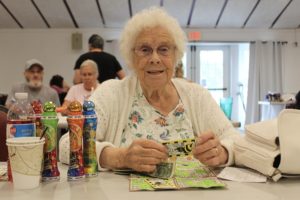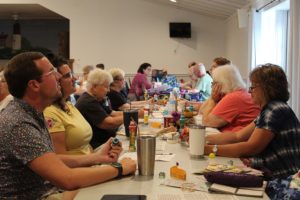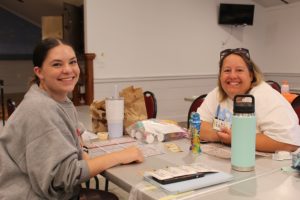EASTHAM — I used to think that bingo was simple. Listen to the numbers as they’re called. Mark them if you see them. Five in a row means you’re a winner. How hard could it be? B-I-N-G-O.
Last Tuesday, I entered the Orleans-Eastham Elks Lodge #2572 at 5 p.m. and over the course of the evening — the five-hour evening — I met the players, learned the game, and concluded that bingo is not so simple after all.

Bingo at the Elks has been a tradition for 40-odd years. It used to take place on Sunday afternoons, but it’s now played every Tuesday. The doors open at 5, the first game begins at 6:30, and the night usually runs until quarter of ten. Usually. Duration depends on the turnout, the games, and the caller.
Brian Eastman, 77, has been calling bingo for 18 years (he thinks — “Is that right, Kenny?”). He is the bookkeeper — a position required by law for organized bingo games. Eastman is responsible for sending the state a weekly report he compiles on everything sold and won on bingo night.
Eastman moved to Eastham in 2003 from Hampstead, N.H., where he ran bingo for the Hampstead Lions Club. He joined the Elks in 1992.
At bingo night, “You get to know people,” Eastman said. “It’s like a little family.”

Margaret Menengas of Wellfleet is a regular who has been coming to bingo “ever since it started,” she says. She is 93 now and used to spend Sundays playing bingo with her husband. The couple would play in Eastham in the afternoon, then drive up to Dennis for a night game.
Her husband has since died, but Menengas still plays, accompanied by her lucky charms (a pink toy elephant, a fox, a mouse, and a stone from Palestine that “looks like a frog”). Menengas sits in her chair (“It’s reserved”), eats her dinner (last Tuesday it was pizza), and marks her board with her special bingo daubers (green, red, orange, and blue).
Menengas’s routine is shared by most who come to the lodge hall every Tuesday. Lucky charms are common, snacks are essential, and seats are territorial. “This is one thing you have to write about: we all have our seats,” cautioned one regular. “Don’t you dare sit in it.”
Although those unwritten rules are clearly important, I also learned the conventional rules of the game. A caller sits at the front of the hall, announcing ball numbers as they come out of a machine whose constant rumbling fills the room. The balls are displayed on two screens — one at each side of the room — alongside a large sign that shows all possible numbers and highlights those that have already been called.
Watch the regulars and you’ll see that they’re watching the screen. Most mark their boards before the balls are even called, moving faster than the caller himself.
There can be as many as 26 games played in an evening, not including a few games that require purchase of special pull-tabs known as the Stinger and the Super Troll. Half the games are played before a 20-minute intermission that happens around 8 p.m. That’s when refreshments are provided, raffle tickets are sold, and a second caller takes the place of the first.

A single card contains six 5×5 bingo squares. For every card of a certain border color, two games are played, each requiring a different configuration to achieve bingo. A card with a green border, for example, was game number six on the bingo schedule last Tuesday. Game six-A was “Letter X,” meaning that the letter X must be formed on the board for bingo. That’s good for $50. Game six-B was “hourglass,” so players had to form the letter X, plus the top and bottom row of the board for bingo. Also good for $50.
When a player gets bingo, she raises her hand, calls out “bingo!,” and waits for someone to read off the numbered code that identifies the board. The room goes silent, save for a few groans, as the rumble of the ball machine ceases. If the bingo is valid, the lucky winner is handed cash — often passed around for friends to kiss first (for luck) — and the night proceeds.
Although the prize for most games is $50, some have larger pots whose value depends on the money generated that evening. In the first game of the night — the “Bonanza” or “Early Bird Special” — the winner receives half of the night’s sales. To win this one, players must reach a “coverall,” marking all spots on one board. The first 40 numbers valid for play are displayed on the screens before the start of the game, so early birds arrive to daub their boards while others trickle in.
Kathy Edmonds and Jane Demeo were daubing early on Tuesday night, their station assembled and ready for play.
Edmonds, Demeo, and friends have their spots strategically positioned beneath a screen on the right side of the hall. Edmonds’s chair is decorated with a black-and-white bingo-themed cushion. Her lucky cardinal, shell, and rock are kept in a plastic baggie. Lucky trolls stand guard beside Demeo’s blue bingo bag, which is decorated with pins and filled with special daubers, highlighters, and charms including a small turtle, a red buddha, and a fire hydrant.

“I always have something to hold on to,” says Demeo.
Demeo and Edmonds, who both live in Eastham, have been coming to bingo for “a lifetime,” according to Demeo. “It’s a social event for us.”
Demeo volunteers here as well. She sports a red apron and arrives early to ensure that the first 40 balls are recorded on the screen. “But I’m here to play,” she says.
She comes to play with a crowd of 40 to 100 others on any given evening. The numbers are bigger in summer, but winter attracts a crew of avid fans.
“It’s a fun family thing to do,” says Jenn Frisch, who brought her daughter, Abby, to play once she turned 18, just as her mother had brought her.
In a room full of experts, I was a newbie, a bingo liar, and often quite confused. I had no charms, no special dauber, and nothing but rotten beginner’s luck. But I was welcomed nonetheless — and I have to say, I might be hooked.
